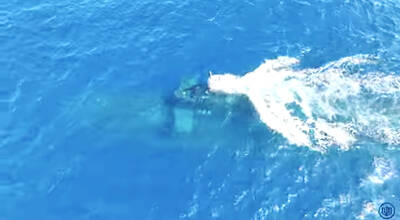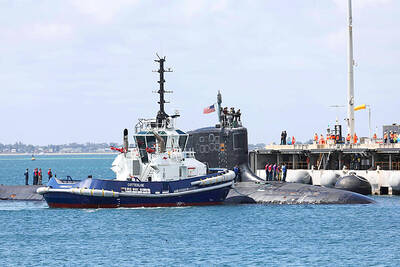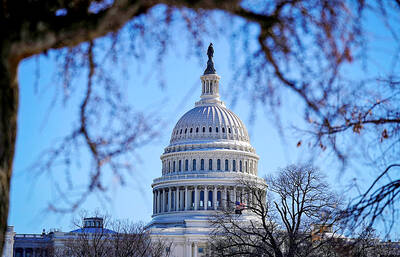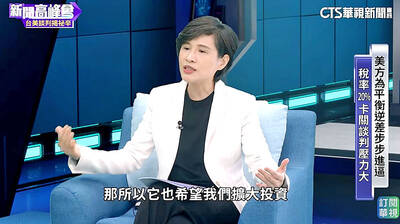Police shot dead an alleged Tibetan independence “insurgent” in northwestern China, state press said yesterday, the first official admission that authorities killed anyone during recent unrest.
A policeman was also killed in the gun battle on Monday in a Tibetan area of Qinghai Province, Xinhua news agency reported.
Tibet’s government-in-exile has said more than 200 people had been killed in a huge Chinese military and police crackdown on protests against Beijing’s rule of the Himalayan region that began on March 10.
Until yesterday’s report, Chinese authorities had insisted they had killed no-one in the crackdown and blamed Tibetan “rioters” for the deaths of 20 people.
China has, however, sealed off Tibet and other hotbed areas in the west of the country that have Tibetan populations to stop foreign reporters and other independent observers from witnessing the crackdown.
Monday’s incident occurred after police went in pursuit of the leader of a handful of “insurgents seeking Tibetan independence,” Xinhua reported, citing the Qinghai public security department.
The group had tried to incite Tibetan herders in Dari county to rally on March 21, a week after major protests erupted in the Tibetan capital Lhasa, Xinhua said.
“After a month-long investigation, the police moved on Monday to arrest the suspected leader. The suspect resisted arrest and gunfire broke out,” Xinhua reported, citing the department. “The officer was killed in the gun battle, and other officers returned fire, killing the suspect.”
Xinhua identified the police officer as Lama Cedain, but did not release the name of the alleged “insurgent” who was killed. Local and provincial police refused to comment when contacted by reporters yesterday.
In a later report, Xinhua said 1,000 people attended the policeman’s funeral, where his body was covered with the Chinese Communist Party flag.

CSBC Corp, Taiwan (台灣國際造船) yesterday released the first video documenting the submerged sea trials of Taiwan’s indigenous defense submarine prototype, the Hai Kun (海鯤), or Narwhal, showing underwater navigation and the launch of countermeasures. The footage shows the vessel’s first dive, steering and control system tests, and the raising and lowering of the periscope and antenna masts. It offered a rare look at the progress in the submarine’s sea acceptance tests. The Hai Kun carried out its first shallow-water diving trial late last month and has since completed four submerged tests, CSBC said. The newly released video compiles images recorded from Jan. 29 to

DETERRENCE EFFORTS: Washington and partners hope demonstrations of force would convince Beijing that military action against Taiwan would carry high costs The US is considering using HMAS Stirling in Western Australia as a forward base to strengthen its naval posture in a potential conflict with China, particularly over Taiwan, the Wall Street Journal reported on Saturday. As part of its Indo-Pacific strategy, Washington plans to deploy up to four nuclear-powered submarines at Stirling starting in 2027, providing a base near potential hot spots such as Taiwan and the South China Sea. The move also aims to enhance military integration with Pacific allies under the Australia-UK-US trilateral security partnership, the report said. Currently, US submarines operate from Guam, but the island could

RESTRAINTS: Should China’s actions pose any threat to Taiwan’s security, economic or social systems, China would be excluded from major financial institutions, the bill says The US House of Representatives on Monday passed the PROTECT Taiwan Act, which states that Washington would exclude China from participating in major global financial organizations if its actions directly threaten Taiwan’s security. The bill, proposed by Republican Representative Frank Lucas, passed with 395 votes in favor and two against. It stipulates that if China’s actions pose any threat to Taiwan’s security, economic or social systems, the US would, “to the maximum extent practicable,” exclude Beijing from international financial institutions, including the G20, the Bank for International Settlements and the Financial Stability Board. The bill makes it clear that China must be prepared

Taiwanese trade negotiators told Washington that Taipei would not relocate 40 percent of its semiconductor production to the US, and that its most advanced technologies would remain in the nation, Vice Premier Cheng Li-chiun (鄭麗君) said on Sunday. “I told the US side very clearly — that’s impossible,” Cheng, who led the negotiation team, said in an interview that aired on Sunday night on Chinese Television System. Cheng was referring to remarks last month by US Secretary of Commerce Howard Lutnick, in which he said his goal was to bring 40 percent of Taiwan’s chip supply chain to the US Taiwan’s almost